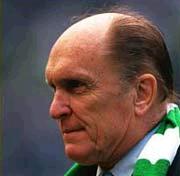When somebody has as much respect as Robert Duvall, he can afford to muscle his way around Hollywood. Duvall (John Q., The 6th Day) spent a considerable amount of time and money to make The Apostle, a good movie about a preacher. He is now the power behind the making of A Shot at Glory, a football (or soccer) movie distinguishable only by how much of a conventional sports movie it is. Aside from the fact that nearly everybody has a Scottish accent, A Shot at Glory is no different from the legion of other movies about the underdogs rising to the occasion. Heck, Mean Machine is nearly the same story and only came out a little while ago. Duvall is Gordon McLeod, the longtime owner of the Kilnockie Knockies, a second tier team nobody cares about. They haven't won many games in a long time, and the stands are now empty during games.
Peter Cameron (Michael Keaton, Jack Frost, Out of Sight), the new American owner, wants to change things. Essentially, he wants to make money. If this means moving the team away from Kilnockie, so be it. McLeod, the team, and the small town do not want this. Football is a tradition in Kilnockie that they want to keep. So they make a deal; if Kilnockie will win this year, then they can stay. Denis O'Neill's (The River Wild) script has little originality in it. Everything moves along a predetermined course until the end. By golly, the Knockies start winning, and as they win more, they become closer as a team, and their fan base grows. Not only that, but soon, as they are nearing the pinnacle of their miraculous ascent to the top, something needs to happen that puts everything they went through in jeopardy.
To make things look more authentic, director Michael Corrente (Outside Providence, American Buffalo) used Scottish footballer Ally McCoist as Jackie McQuillan, troubled star of the Knockies. He is returning to the team after some time away, and is not on good terms with McLeod. This is mainly because McQuillan was, for a time, married to Kate (Kirsty Mitchell, The Acid House, Al's Lads), McLeod's daughter. The marriage did not last, and even though Kate forgave McCoist, McLeod did not. Aside from the soccer story, another story involves the relationship between McLeod and McCoist. The two must learn to work together and trust each other, else the Knockies will have no chance at winning. Along those lines, there is another subplot about the rebuilding of trust between Kate and McCoist. There is also an underdeveloped story involving Kelsey (Cole Hauser, Tigerland, Pitch Black), a new American player on the team.
A Shot at Glory moves at a decent clip, most likely because the soccer scenes actually look interesting, much more so than what happens off the field. Kate seems to be trying awfully hard to reconcile with a man that the movie portrays as a jerk. Even when the script has him begin to improve as a person, it's never believable. It is also hard to muster the type of support necessary to root for the Knockies to succeed. Keaton is horribly underutilized, and Duvall seems half absent. Sports movies need the audience rooting for the team, especially if they plan to be as bland as A Shot at Glory.
